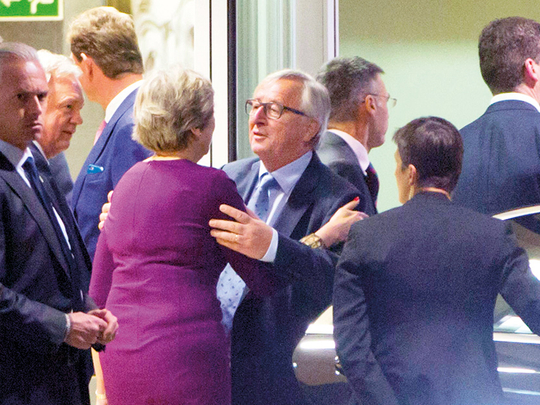
MADRID: There seems to be little, if any, prospect the United Kingdom and the European Union will reach agreement anytime soon on three core issues that are a precondition for full-fledged talks over Brexit.
The European Union 27 (EU27) are to meet in a summit in Brussels starting Friday and will decide if the UK has done enough on the core issues — protecting citizens’ rights, making sure the border between Northern Ireland and the Republic of Ireland stays open, and settling its dues with the European Union — to warrant moving on to wide talks.
As it stands now, that summit is likely to dismiss progress in the Brexit talks as being too little and too slow, and looks not inclined to allow the EU’s negotiators to move onto other areas as trade or a transition deal that would cover Britain after the March 29, 2019 deadline transpires.
Despite a flurry of telephone calls between 10 Downing Street and key European leaders on Sunday and Monday, and even with British Prime Minister Theresa May having a two-hour working dinner in Brussels Monday night with top EU officials, the general sentiment among the EU27 is that Britain has failed to do enough so far in the talks.
Given that there is only a two-year period in which any deal can be worked out to extrapolate the UK, its laws and economy from the EU after 43 years of membership, time is ticking. That final Brexit deal — if there is one — will have to be approved by the governments of all remaining 27 EU member states, the European Parliament and European Commission, the negotiations ought to be wrapped up by the end of 2018 at the latest.
On Sunday and Monday, May held telephone discussions with French President Emmanuel Macron, German Chancellor Angela Merkel and Irish Taoiseach Leo Varadkar to convince them that her government was committed to the talks, was negotiating in good faith, and wanted the Brexit process to move on to the next phase, away from the three core issues.
Media reports say that Merkel and May agreed to differ, Macron was non-committal, and Varadkar underscored the need for maintaining the status quo on the border.
Merkel is the de facto leader of Europe and is determined that the terms of the final Brexit deal — if any — will penalise the UK for its decision to leave and deter any other nations from holding ‘Leave’ referendums.
Macron is eager for Paris to capture the €1 trillion (Dh4.31 trillion) clearances daily that currently are fed through London’s financial institutions — the loss of which experts say could amount to 10,000 jobs in the City.
And Varadkar is determined that there will be no return to a hard border between Northern Ireland and the Republic, with either security or customs checks that would impede services and goods, or reignite the political and sectarian conflict that claimed more than 3,600 lives before the Good Friday Agreement was signed in 1998.
As with any divorce, money remains a sticking point. So far, May has offered €20 billion to cover the UK’s commitments to the EU budget and other institutions after it leaves. Various EU officials have mentioned a sum as high as €100 billion. Regardless of the actual amount that might be agreed, for hardline anti-EU ministers in May’s own Cabinet, any euro is a euro too much.
Indeed, given May’s weakened position after a disastrous general election that left her Conservatives dependent on the support of Northern Irish unionists to govern, there seems to be less impetus now for the EU27 to make any compromises to the British.












